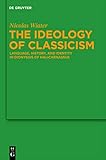The Ideology of Classicism : Language, History, and Identity in Dionysius of Halicarnassus / Nicolas Wiater.
Material type: TextSeries: Untersuchungen zur antiken Literatur und Geschichte ; 105Publisher: Berlin ; Boston : De Gruyter, [2011]Copyright date: ©2011Description: 1 online resource (395 p.)Content type:
TextSeries: Untersuchungen zur antiken Literatur und Geschichte ; 105Publisher: Berlin ; Boston : De Gruyter, [2011]Copyright date: ©2011Description: 1 online resource (395 p.)Content type: - 9783110256581
- 9783110259117
- 880.9/001
- PA3967.Z6
- online - DeGruyter
- Issued also in print.
| Item type | Current library | Call number | URL | Status | Notes | Barcode | |
|---|---|---|---|---|---|---|---|
 eBook
eBook
|
Biblioteca "Angelicum" Pont. Univ. S.Tommaso d'Aquino Nuvola online | online - DeGruyter (Browse shelf(Opens below)) | Online access | Not for loan (Accesso limitato) | Accesso per gli utenti autorizzati / Access for authorized users | (dgr)9783110259117 |
Dissertation Univ. Bonn 2008.
Frontmatter -- Preface -- Table of Contents -- 1. Introduction: The Aims and Methods of This Study -- 2. Reviving the Past: Language and Identity in Dionysius’ Classicism -- 3. History and Criticism: The Construction of a Classicist Past -- 4. Knowledge and Elitism: Being a Classicist Critic -- 5. Enacting Distinction: The Interactive Structure of Dionysius’ Writings -- 6. Conclusions -- References -- Indices
restricted access online access with authorization star
http://purl.org/coar/access_right/c_16ec
So far, the critical writings of Dionysius of Halicarnassus have mainly attracted interest from historians of ancient linguistics. The Ideology of Classicism proposes a novel approach to Dionysius’ œuvre as a whole by providing the first systematic study of Greek classicism from the perspective of cultural identity. Drawing on cultural anthropology and Social Identity Theory, Wiater explores the world-view bound up with classicist criticism. Only from within this ideological framework can we understand why Greek and Roman intellectuals in Augustan Rome strove to speak and write like Demosthenes, Lysias, and Isocrates. Topics addressed by this study include Dionysius’ view of the classical past; mimesis and the aesthetics of reading; language and identity; Dionysius’ view of the Romans, their power and the role of Greek culture within it; Greek classicism and the contemporary controversy about Roman identity among Roman intellectuals; the self-image as Greek intellectuals in the Roman empire of Dionysius and his addressees; the dialogic design of Dionysius’ essays and how it implements a sense of elitism and distinction; Dionysius’ attitudes towards communities competing with him for leadership in rhetorical education and criticism, such as the Peripatetics and Stoics.
Issued also in print.
Mode of access: Internet via World Wide Web.
In English.
Description based on online resource; title from PDF title page (publisher's Web site, viewed 28. Feb 2023)


